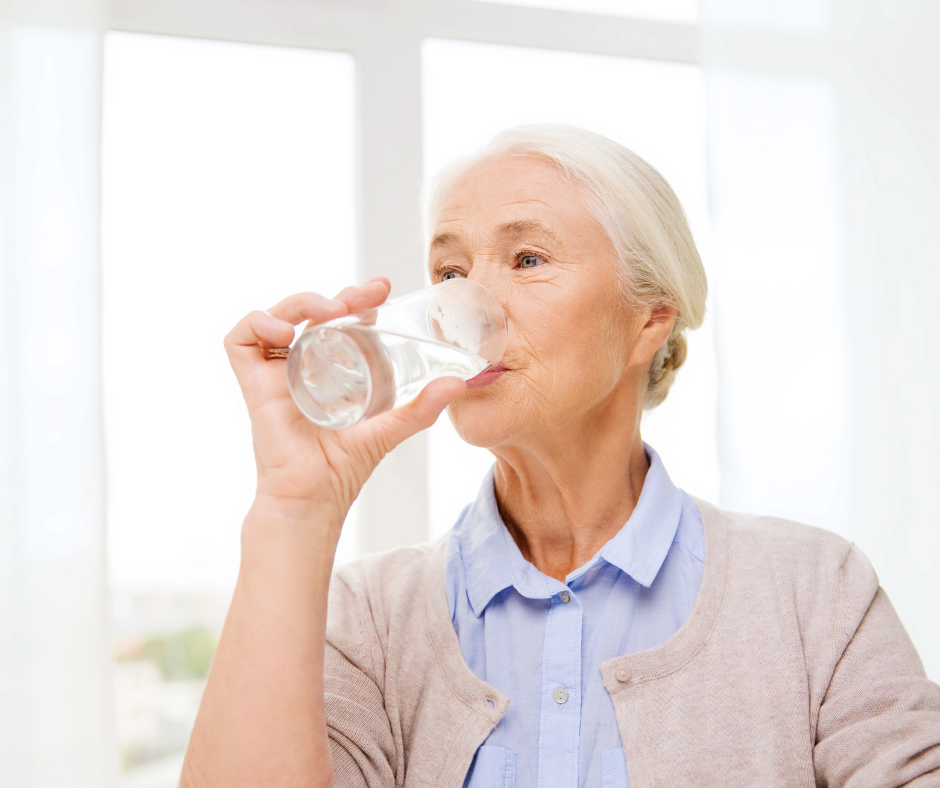
Did you know that water makes up 50-70% of the human body? As you can probably imagine, that means it’s pretty essential for our health. Yet, for most of us, staying hydrated rarely ranks as a top priority. We may drink water when we’re feeling especially thirsty or when it’s hot out, but for the most part, it’s not something we give much thought to.
Unfortunately, not paying enough attention to water intake can have a negative impact on health, and these effects are more problematic the older we get. In this article, we’ll share what water does for the body, why it’s so important as we age, and tips for staying hydrated at any age.
The role of water in the body
In a nutshell, water is vital for every cell in the body to function correctly. It regulates body temperature, keeps joints and muscles lubricated, delivers nutrients to cells, keeps organs working, and facilitates all of our bodily processes like fighting infection, digestion, and waste removal.
Another crucial way that water helps our bodies is by promoting healthy brain function. Drinking enough water helps keep the nervous system and the brain communicating correctly, which will improve focus, alertness, and memory. On the flip side, dehydration can lead to mental confusion and fatigue, and long-term chronic dehydration can lead to premature brain aging.
So just how much water do we need to make the body function at its best? There’s an ongoing debate about the amount adults need to stay healthy. According to Mayo Clinic and Harvard Health, a good range for women is around 90 ounces, and for men that number is about 125 ounces.
However, it’s important to note that the amount needed could be different depending on the situation. Certain health conditions and medications can alter the recommendation. Lifestyle factors and weather play a role, too. The best course of action is to talk with a doctor to get the best advice for your loved one’s situation.
Why staying hydrated is more important (and more difficult) as we age
Research tells us that hydration is a problem for older adults. A UCLA study found that 40% of seniors may be chronically under-hydrated, and adults aged 65 and up have the highest hospital admission rates for dehydration.
Aging affects our ability to stay hydrated in a few different ways. Mayo Clinic explains: “As you age, your body’s fluid reserve becomes smaller, your ability to conserve water is reduced, and your thirst sense becomes less acute. These problems are compounded by chronic illnesses such as diabetes and dementia, and the use of certain medications. Older adults also can have mobility problems that limit their ability to get water for themselves.”
There are a couple of different reasons dehydration in seniors doesn’t get addressed. First, most people aren’t aware that hydration needs change with age, as explained above. And second, the early symptoms of dehydration can often be attributed to other medical conditions or medications, or we dismiss them as a natural part of aging.
If older adults don’t stay hydrated, there can be some unpleasant consequences. It can make health conditions that they are already experiencing worse, and it can lead to new issues that didn’t already exist. Dehydration can cause urinary tract infections (UTI), kidney stones, and more. And because not being hydrated can cause dizziness and muscle cramps, it can increase the risk of falling, which is one of the leading causes of hospitalization in seniors.
Clearly, staying hydrated should be a top priority for your loved one. Next, we’ll share several tips for helping them do so.
Tips to avoid dehydration
Just like any lifestyle modification, it can take some planning and effort to be successful. Here are a few tips to prevent or you and your loved one from becoming dehydrated:
- Know the symptoms–Knowing what dehydration looks like can help you nip it in the bud.
- Dry mouth
- Dark-colored urine or a tiny amount of urine
- Fatigue
- Dizziness
- Muscle cramps in limbs
- Headaches
- Feeling weak or unwell
- Being sleepy or irritable
- Talk to a doctor–A medical professional will recommend the appropriate water intake based on specific factors like health conditions, medications, and lifestyle.
- Make it a habit–Try to associate drinking water with everyday activities. For example, drinking a glass of water upon waking and with every meal. Getting on a schedule with drinking water will help increase the frequency.
- Make it taste better–Water doesn’t have to be boring! Consider drinking flavored sparkling water or using flavor drops to mix it up.
- Think beyond water–Drinking water isn’t the only way to stay hydrated. There are many beverages like tea and milk that contain high amounts of water. You can also incorporate fruits and vegetables with high water content into your diet. Melons, cucumbers, and celery are just a few possibilities.
- Track it–Keeping track of how much water is being consumed can help keep it top of mind. There are even water bottles that incorporate tracking functionality. This affordable bottle has unique inspirational quotes and time markers on it to help you stay motivated. There are even high-tech water bottles like this option that connect to an app on your phone for reminders and light up when it’s time to drink more.
Conclusion:
Getting the right amount of water is a simple yet crucial practice for maintaining your health. Being under-hydrated or dehydrated can worsen existing health conditions and may even lead to additional issues like kidney stones and UTIs. Make a conscious effort to stay hydrated yourself and help your loved ones do the same.
If you’d like to learn more about how a caregiver can help your loved one with the activities of daily life (like staying hydrated!) and more, check out our service pages. And when you’re ready, book a complimentary discovery call to talk with a client service specialist.